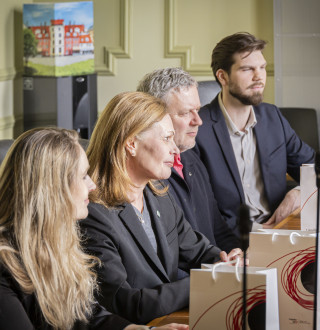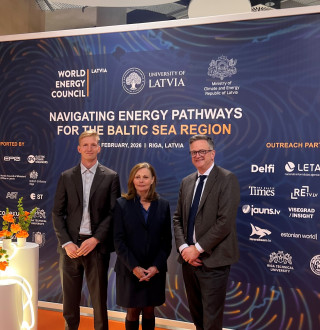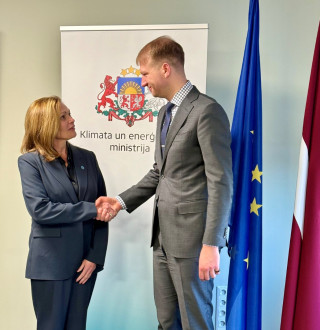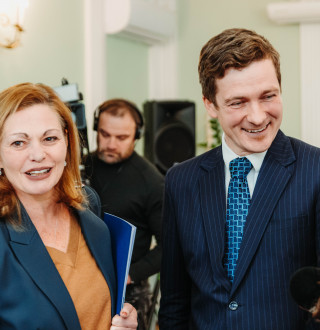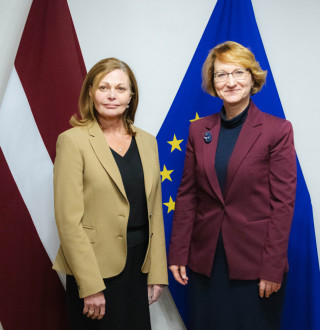Icelandic politician Bryndís Haraldsdóttir, President of the Nordic Council, visited Latvia in the beginning of June and joined two panel discussions at the festival Lampa in Cēsis alongside the Latvian Foreign Minister Baiba Braže and Svetlana Tikhanovskaya, leader of the Belarussian opposition. Besides sharing overall position of the Nordic Council, she also touched upon the matters hot on the agenda in Iceland and benefits of maintaining close ties between Iceland and Latvia.
Being part of the Icelandic delegation to the Nordic Council since 2021 you have been elected the President of the Nordic Council which according to the rotation in the chairmanship among the member countries is a position for a year. How important is this position for Iceland?
The Nordic Council is the biggest organisation for international cooperation in Iceland in terms of member representation. We have seven members in the Nordic Council, whereas in the other international cooperation organisations such as the NATO, the Organisation for Security and Co-operation in Europe (OSCE PA), and the Council of Europe we have two or three representatives. Being part of the Nordic Council is very meaningful for Iceland and polling shows also great support from the general public. Iceland is highly integrated with the EU through membership in the European Economic Area and the Schengen Area, however, it is not part of the EU, and the idea of joining the EU is not currently on the agenda of my party and most parties in the Icelandic parliament. However, we highly value being part of the Nordic Council and the close Nordic cooperation since it makes us stronger standing for the matters we share with all the Nordic countries such as peace and security in the region, and, certainly the environment and gender equality.
Is there a place for your personal agenda for this year of presidency?
To some extent, there is. Upon election, the president of the Council sets the tone in a way by defining the priority areas for commissions and ministers. This year’s focus is on the Arctic issues. Since I became the member of the Icelandic Parliament in 2016, Arctic and the environmental issues have constantly been on my table. It has included also the work within the Arctic Council together with all the other Nordic countries, Canada, the United States, and previously also Russia, which has a big stake in the Arctics. The Arctic issues have recently been priority also for the Western Nordic Council, which is a cooperation between Iceland, Greenland and the Faroe Islands.
The Arctic issues reach far beyond Iceland – it is a matter of great interest for all the Nordic countries, and even the Baltic countries. Priorities of our presidency are peace and security. In the Arctic and beyond. Security touches upon broad aspects of our daily life. Beyond military security. It includes food security, energy security, economic security, social security, and the list goes on. Having all aspects of it in mind, we strive to focus on the top of the globe, so to say – the Arctic.
The Nordic Council’s focus on security was one of the reasoning behind your participation in the panel discussion at the Lampa festival alongside the Latvian Foreign Minister Baiba Braže. Is security a big concern specifically in Iceland? Being remote from the active war zones and living in peace, is security a topical matter in Iceland?
It is an issue of great importance in Iceland. Being an isolated island in the middle of the North Atlantic is what makes Iceland vulnerable. Therefore, we highly value the agreement with the USA on defence and also being one of the founding members of NATO. Although security is a top priority in Iceland, I think the general public in the Baltic States are much more aware of the regional security concerns and implications. The remote location and the fact that Iceland doesn’t have an army, sends a signal that we feel safe and secure, and we certainly were hoping for peace to be reassured for all the future. However, the Russian invasion of Ukraine has shifted the local perspective, reminding that these are not the times of peace. We see the democratic values that the Nordic nations rely on being threatened. We have to defend our freedom, and we agree with the statement that Ukraine is fighting also for our – regional – freedom. Most of the general public of Iceland supports Ukraine and understands the importance of such support, yet the attention is sliding away with people shying away from the topic particularly due to the remoteness of Iceland. I think the politicians who have the opportunity to work closely with colleagues here in the Baltic States have a better grasp of the real circumstances and we must keep the general public of Iceland aware of the matter and of the possible threats to the freedom and democracy of our country.
Is cyberwar also an issue in Iceland?
Yes, cyber warfare activities are ongoing also in Iceland. Recently, the main newspaper was attacked by an organisation of Russian origin. We can feel this happening in our daily life, however, I’m not sure that the general public recognizes how big of a threat to the democracy it actually is. There is no obvious Russian propaganda in Iceland as it is in Latvia, but we might have it in the shadows, so to say. Icelandic politicians, the foreign minister and staff of the foreign committee have noticed a shift on the social media communication – from lots of likes to the posts on Ukraine to less likes and more offensive, aggressive comments raising doubt that there is an actual person behind it. That is an unfamiliar terrain and a surprising turn for parliamentarians of such a small country and small language as Iceland. Those are all signs of things brewing out our immediate sight. We have to be aware of it and raise also awareness of the general public on what is going on. That is a constant fight. Nordics are known for the high level of trust being considered the Nordic gold – we have to stay alert to prevent the Nordic gold from being stolen from us.
Besides disseminating false information about Ukraine and Russia, another method of hybrid war is dividing the local society by heating up the matters with the potential of raising fury in some groups of people. Do you see that happening in Iceland?
We see that happening around the matter of Palestinians and Gaza. The Icelandic parliament quickly condemned both the Hamas attack on Israel and Israeli actions that cause civilian suffering in Gaza, but there I still a surprising degree of anger directed at the parliament and the government r. There are of course legitimate differences in views on what is happening in the Middle East and how to react to it and in a democratic society all voices have to be heard. But with the events taking place so far from us, the level of aggression and the direction of the reaction seems unnatural. There are a lot of protests taking place and I’ve seen hate in the eyes of Icelandic people towards Icelandic ministers. There is no doubt of the horror happening in the Middle East, however, I think such events are being used to divide us through propaganda and misinformation. I don’t see a reason for this matter splitting our society since we all want peace. We want peace in the Middle East as much as everyone else. So, I wonder why people in Iceland are fighting about this. It seems probable that someone is stoking the fires and using the fuelled discussion for their benefit. Sadly, I think terrible events like that are being used to divide us.
You joined two panel discussions at the democracy festival Lampa, do you see value in such discussions and having such festival in general?
It is certainly important. The panels I participated in were really good. The one on Belarus was important for keeping the topic on the agenda. It is particularly important for the Belarussian people, but it is also important for us – the Nordic and the Baltic States – that the democratic order is restored in Belarus one day. The second panel was about the safety and security alongside the Latvian Foreign Minister Baiba Braže. Security is another huge issue for the Nordic countries.
I’m learning a lot about the idea of democratic festivals since it’s not only my first time in Latvia, but also my first time in any democracy festival. I see a huge possibility of expanding such gathering Iceland – we have only a small event that we’ve been trying to develop. I see great opportunities in this, and I have many learnings from Latvia. The main reason for having such events is to take people deeper than headlines in the news or on the Instagram and Facebook feed. Discussions are crucial in a democratic society. This allows the general public to hear different perspectives, ask questions, instead of just taking in the information presented to them on the media. I consider such events important and helpful for building trust – the Nordic gold – and for the future of democratic nations.
What’s the nature of cooperation between the Nordic Council and the Baltic Assembly?
Cooperation between the two organisations has been tight for years; even a long time before I joined the Nordic Council. The Baltic Assembly is in fact the closest international partner of the Nordic Council. Members of the two organizations meet several times each year. When the Baltic Assembly was founded its structure and work was heavily inspired by the Nordic Council and Nordic cooperation in general. Later on, and especially after the full-scale invasion of Ukraine, the situation has changed. Now we are listening and learning from the deep and long experience of our Baltic colleagues who have been living with and for years warning about the threat from Russia. At first we in the Nordics didn’t really take notice but now we certainly do.
A good example of how this process has worked is a very memorable meeting the Nordic Council and the Baltic Assembly organized together in Iceland two years ago to discuss the Russian invasion and how the Nordic Countries could help. Among our guest speakers were the Ukrainian member of parliament Lesia Vasylenko and the journalist Elina-Alem Kent of the Kyiv Independent Besides the Ukrainian delegation, we welcomed members of Svetlana Tikhanovskaya’s team from Belarus, which has a special place in my heart. And the event was attended also by Evgenia Kara-Murza, wife of Vladimir Kara-Murza, the Russian opposition activist. We would have never been able to arrange this event without the help of the Baltic Assembly. They assisted greatly in drawing up the list of invitees for whom it would be safe to take such trip to Iceland. All of that was done with the direct support from the Baltic Assembly who have proved to be our close friends. The event was an eye-opener for many of the Nordic parliamentarians – Ukrainians and Belarussians shared their stories, and our colleagues from the Baltic States explaining how close the conflict with Russia actually is and how have you been experiencing it. There is a lot we can learn from our Baltic colleagues on this matter.
You mentioned your closeness to Belarus, in what way is it close to you?
As a member of the OSCE PA I was invited to observe voting procedure and the vote counting at the parliamentary election in Belarus in 2019. What I witnessed was beyond sadness. The local staff knew of our presence, they just did not care. We were not supposed to raise any issues; we were just supposed to fill out the report forms. Seeing that they were not counting the ballots felt sickening. They were just deciding who would get each vote. Inviting international observers to the election was a decision by Alexander Lukashenko trying to look good to the rest of Europe. The election was not free and fair in any way, and Lukashenko knew that. The following year the president election was held, and international observers were not invited.
Seeing the so-called election process in Belarus was eye-opening for me. I could not had imagined such disregard of the democratic election process since I had only experienced fair, democratic elections in my own country. We met local people holding distinct opinions – an older man who was living in the countryside supported Lukashenko, and a young adult who was not even planning to vote. Missing the elections seemed unimaginable to me since I consider voting at the election the foundation of the democracy. I was told that in Belarus voting is not voting. I saw that being true with my own eyes. I think many people in the Nordic countries don’t truly understand the concept “not real elections”, since all they know are elections we have in the Nordics. It was an incredible honour to meet Svetlana Tikhanovskaya at the panel discussion organised by the Nordic Council of Ministers’ Office in Latvia and the Danish Cultural Institute at the festival Lampa. She was asked repeatedly what the next elections in Belarus will bring. She replied that it’s not really an election what is happening in Belarus. For those living in a democratic state, elections mean something else.
What is the view of the Nordic countries on Belarus, its possible future democracy and potential future role in the security and prosperity of the region?
Nordic countries have a special connection to the Baltic States, and we co-operate closely. I see great potential in developing the discussion on the possible future democratic neighbouring with Ukraine, Belarus, and, hopefully, at some time also Russia, although, at this point, Russia is far from that. I have also learned that we have historical ties between Iceland and Belarus and I’m hopeful for democratic elections taking place in Belarus where people can choose their own leaders, elect the parliamentarians leading to a great cooperation and future together. Until then, I consider it important for the organisations like the Nordic Council and the Baltic Assembly to support the democratic opposition and the democratic discussion in Belarus and with Belarussians situated outside Belarus.
With closing national borders, it is becoming increasingly difficult for Belarussians to come to the Baltic and Nordic countries. What do you think should be done to keep these channels open for people who are trying to flee their country?
Closing borders and relocation of refugee is a hot topic, and there is no clear solution in sight. Ukrainian parliamentarians and members of the Belarusian opposition attending our session in Reykjavik highlighted the importance of the people fleeing Russia and Belarus to be admitted into the Nordic of Baltic countries. Finnish parliament is currently deciding upon keeping the border with Russia closed to Syrian refugees used by Putin in the way of hybrid war against Finland, the Nordics and the European Union. I do not have a remedy, but we certainly need to keep the matter in focus.
What has the Sweden’s and Finland’s membership to NATO given to Iceland and the Nordic cooperation from the economic, political and military perspective?
In the Nordic cooperation and the Nordic parliaments, the topicality of security issues is raising. After the invasion a lot has changed. All the international cooperation that I’ve experienced as a parliamentarian, has evolved around the events in Ukraine. Before the invasion, I think, many people in the Nordic countries were quite naive. I think people in the Baltics were much more realistic and more prepared. I thought that I would not live to see physical warfare as the invasion in Ukraine, like boots on the ground. We had been preparing for the cyber threats and hybrid activities, but this was an eye-opener for many in the Nordic countries. We saw it in the way Finland and Sweden were running really fast to apply for the NATO membership upon the invasion. I think it will definitely change the cooperation among the Nordic and Baltic countries. The ties are now stronger and closer than before the invasion. For us, the parliamentarians in the Nordics, it is important to maintain discussions with the Baltic parliamentarians. Hyper threats are a huge issue also in the Nordic countries, and the Baltic States to a great extent have been the front-runners in cyber security, and we can learn a lot from you.
Iceland doesn’t have an army. We are a very small nation, still we are one of the founding members of NATO. Our key to security is NATO. And of course, we have to put something on the table, and there are many ways to do it. I have started discussion on possibly creating a Nordic army at some point in the future. Nordic armies are working closely together, and maybe it will evolve into shared force in the Nordics; maybe even the Nordic-Baltic now that we’re all in the NATO. I think the recent addition to the NATO membership will change a lot.
Iceland’s contribution to the NATO budget is still less than 2%...
Iceland spends less than 2% of GDP in defence, because we don’t have an army. However, I have to mention that the society overall is built differently in Iceland. Vulcanic eruptions around Grindavik have forced us to evacuate a whole town of 4000 people. We have been building walls to prevent lava from going to the town and towards a huge power station. Army would probably be involved in the process, had it happened in another country. In Iceland, national police and other services are doing that kind of work. Certainly, we could put more in our defence as the NATO member, but I also have to mention our logistic situation, which is geopolitically very important – the Arctic area particularly. The Nordic Council is currently focusing a lot on the safety and security in the Arctic due to having this neighbour – Russia, which covers half of the Arctic. Security in the Arctic relies on the international law and the presumption that the international law is observed. But what will happen when the international law is breached? There we have a huge ice-sea area, which will be difficult to defend…
What can politicians do to ensure the engagement of youngsters in politics and in the many elections happening this year?
I’m not worried about the youth in Iceland in that sense, since they are quite active. Possibly, not so much in the sense of choosing a political party to support, but they are activists. They are known for using different forms of engagement and fighting for what they care about. There is a strong view that in the recent presidential election in Iceland, the winner – current president – Halla Tómasdóttir, might have won due to her being focused on the young people and reaching them on social media.
Moreover, the Nordic Youth Council is part of the Nordic Council. It consists of active youngsters who are doing a great job. In August, I’m meeting them in Utøya, Norway, at the summer session gathering engaging youngsters from all the Nordic nations. I think we have loads of opportunities with youngsters on getting them more involved in politics. However, as a mother of teenage sons, I also have to admit that what is going on TikTok or other social media channels gets me worried. I consider media literacy and getting youngsters and also adults aware of the influence of social media content very important. I think it should be covered also in educational programmes.
I see great opportunities in working towards youngsters. Those of us who are somewhat older can actually learn so much from them – how they activate themselves in groups covering different aspects that they’re following and fighting for.
How equal are the Nordic countries in the Nordic family of nations? Do you as a representative of Iceland feel as a smaller “sister” or “brother” in any sense?
To some extent, Iceland is a smaller sibling in the Nordic context, but we don’t mind. We speak out, and we feel heard when we do. So, we are equal in that sense. However, the mood is somewhat different in Greenland, the Faroe Islands, and Åland. Having even two members in the Nordic Council each and less than full rights of participation in the Nordic cooperation in general, they do not feel as equals. This has spurred a discussion on amending the Helsinki Agreement to find a way for everyone to feel included. These three territories are not independent nations, although Greenland and Faroe Islands are quite autonomous – they have their own parliament and ministers; they have, however, historically not been directly involved in foreign affairs, though that is changing as a result of their ongoing debates and negotiations with Denmark. We Icelanders feel a strong bond with our neighbours in the Faroe Islands and Greenland. We still have a memory of our independency struggle and how it feels to be not fully autonomous and equal to others in the international arena, so we have great sympathy for the wishes of these nations.
What are your impressions of Latvia with this being your first visit here, and what do you think are the untapped opportunities for cooperation between Latvia and Iceland?
Latvia is a beautiful country, and I see here some connections to other Nordic nations. I feel that we are close in that sense. It is noticeable in architecture as well as landscape. I find both Cēsis and Riga absolutely beautiful. And I see many opportunities for cooperation between Iceland and Latvia besides what is already ongoing. Some Icelandic companies have been opening their offices here, and I would like to see tourism industry intensify between the two nations. Luckily, we have a direct flight now several times a week, but there are still great opportunities for cooperation in tourism. At least Icelanders would appreciate this sunny weather; I’m not sure Latvians would like to go to Iceland since it’s not that sunny – it’s more windy and rainier, yet amazing in its own way.
